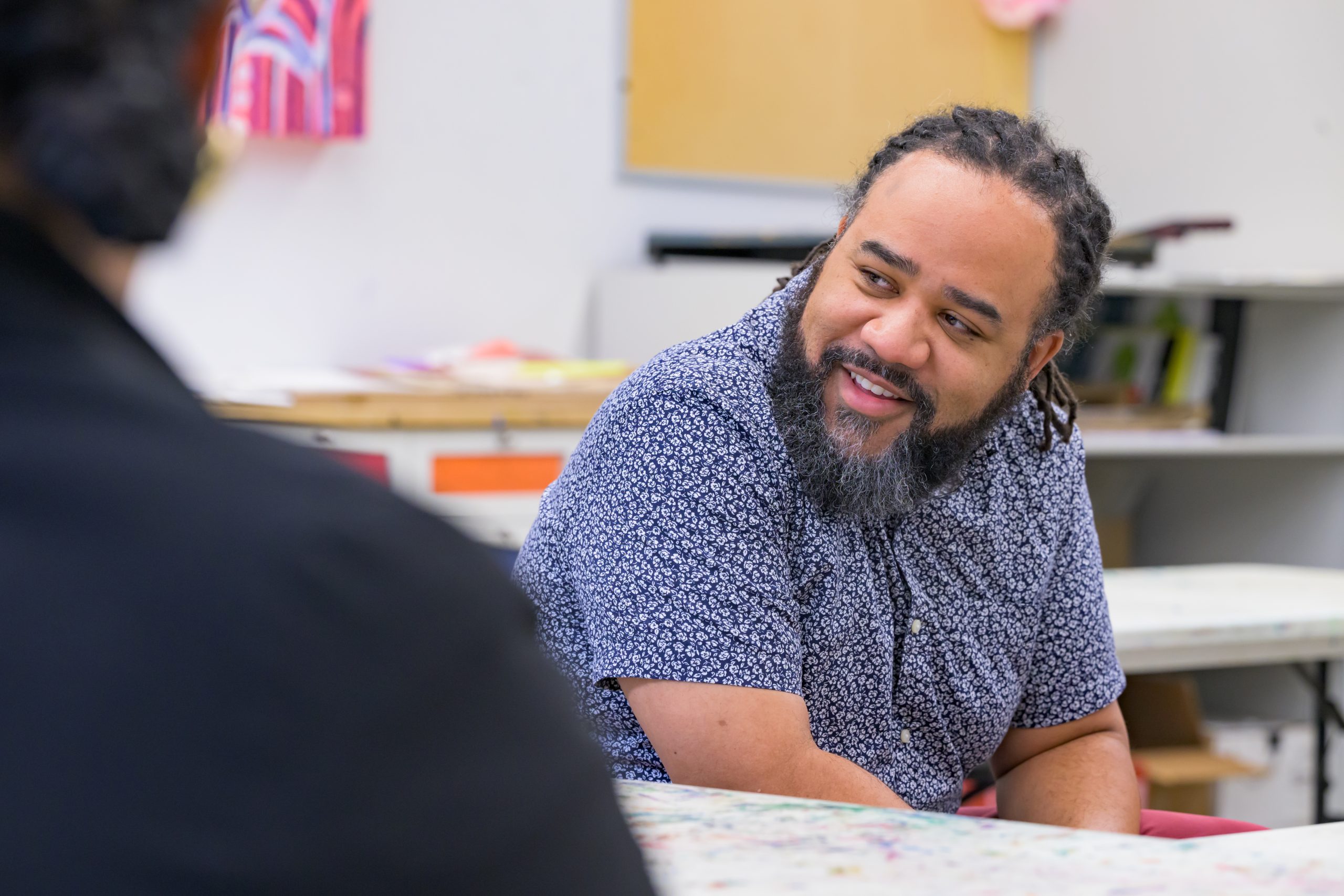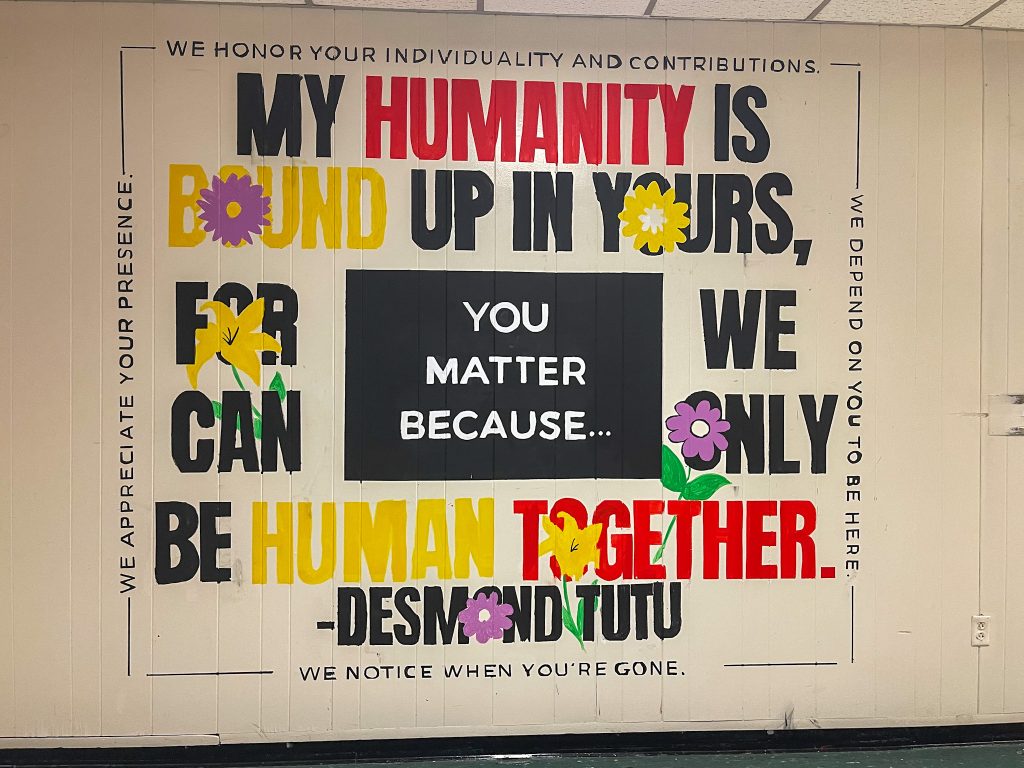New CEHD Faculty Scholar

Roderick L. Carey appointed CEHD Faculty Scholar in recognition of outstanding scholarship in human development and family sciences
Roderick L. Carey, associate professor in the College of Education and Human Development’s (CEHD) Department of Human Development and Family Sciences (HDFS), has been appointed as the CEHD Faculty Scholar. This endowed position seeks to recruit and retain outstanding young scholars in the field of human development and family sciences.
Carey’s interdisciplinary research seeks to make sense of the school experiences of Black and Latinx adolescents in urban contexts, drawing upon critical theories, sociological tools and constructs from developmental and social psychology. Using qualitative approaches, he researches macro and micro issues related to families and schools, teacher education and professional development related to equity in education. His articles have been published in the American Educational Research Journal, the American Journal of Education, Education and Urban Society, Educational Administration Quarterly, the Harvard Educational Review, the Journal of Applied Developmental Psychology and Urban Education, among others.
“Rod conducts critical and timely research on the educational experiences of underrepresented students, especially Black and Latinx boys and young men,” said Gary T. Henry, professor in CEHD’s SOE, who nominated Carey for the appointment during his tenure as CEHD dean. “In his short time at UD, he has not only conducted groundbreaking work in his field, but demonstrated a profound commitment to equity, diversity, and inclusion in education through his research, teaching and service. He is already recognized as a leader in this area, and I eagerly look forward to the development of his promising career.”
Carey’s projects include the Black Boy Mattering Project, which seeks to understand how Black boys conceptualize their worth, and Finding Future Selves, which focuses on how Black and Latinx adolescent boys and young men conceptualize their post-secondary school futures and enact college-going processes. His research has also expanded to include the perspectives of girls and young women of color on factors that shape their perceived worth or mattering.
Carey’s most recent article, titled “The Postsecondary Future Selves of Black and Latinx Boys: A Case for Cultivating More Expansive Supports in College-Going Schools,” was published in The American Educational Research Journal, the flagship journal of the American Educational Research Association. This work offers a rich, ethnographic case study on how Black and Latinx boys imagine their postsecondary futures. With attention to the students’ first-person narratives about their school experiences and personal aspirations, Carey shows how their high school — a Mid-Atlantic college preparatory school in the United States — ultimately fails to understand and support their college, career and personal aspirations for life after graduation.
“The University of Delaware and HDFS are so fortunate to have Rod as a member of our faculty,” said Jason Hustedt, professor and chair of HDFS. “Rod’s work on Black and Latinx boys is groundbreaking, but he is also a Delawarean who returned home to conduct this nationally important work in our local communities.”
Carey also partners with Delaware museums to create opportunities for high schoolers to imagine their societal mattering in new ways by engaging with cultural artifacts and artwork. Since 2019, he and his research team have taken more than 50 Delaware high school students to local art museums and exhibits. In 2024, he and his team partnered with local artist Jarret “Posi” Harris and the Unified Creative Exchange to co-design and paint a large “mattering” mural at Glasgow High School. Research and activities related to these projects was supported by grants from the National Academy of Education/Spencer Foundation, UD’s Partnership for Public Education, UD’s Research Research Foundation and the National Urban League.

“I’ve been a part of the Black Boy Mattering project since its inception, and it has and continues to be an awesome project,” said Camila Polanco, a doctoral student in human development and family sciences. “We started out with just 17 boys. That number has since tripled, and we’re now including girls in the process. It’s been amazing to see this growth and engage in insightful conversations with the brilliant students who’ve joined the project along the way.”
Outside of UD, Carey has been invited to deliver speeches, lectures and research presentations locally, nationally and internationally. He has appeared on numerous podcasts and has been invited to write blogs about his research for outlets like the Forum of the American Journal of Education, and for the Official Blog of Kappa Delta Pi. He has been featured for his expertise by Diverse: Issues in Education, NBC News and WHYY, among other outlets. He has also consulted with independent schools, summer camps and organizations such as the Southern Poverty Law Center on issues related to race, justice and education. He serves on the Board of Trustees for Salesianum School, the region’s premier school for boys.
Carey’s students often express gratitude for his mentorship and the care he takes in supporting the next generation of scholars in human development and family sciences.
“Dr. Carey took me on as a student early in his career and immediately treated me as his collaborator,” Polanco said. “He showed me immense patience in training me as a scholar and included me in important opportunities, such as co-authoring papers to strengthen my CV and expand my work. Dr. Carey is also really understanding and compassionate and made me feel like a trusted colleague from the beginning.”
In recognition of his early career research, teaching and service, Carey was named an Emerging Scholar by Diverse: Issues in Education in 2022, and he received the Dr. Carlos J. Vallejo Memorial Award for Emerging Scholarship from the American Educational Research Association Multicultural/Multiethnic Special Interest Group in 2024.
To learn more about Carey’s work and CEHD research in equity and diversity, visit CEHD’s research page.
Header Image Caption: Roderick. L. Carey, CEHD associate professor, works with Delaware high school students at the Delaware Art Museum.
Article by Jessica Henderson. Photos by Evan Krape and Nataniel Speaks.



